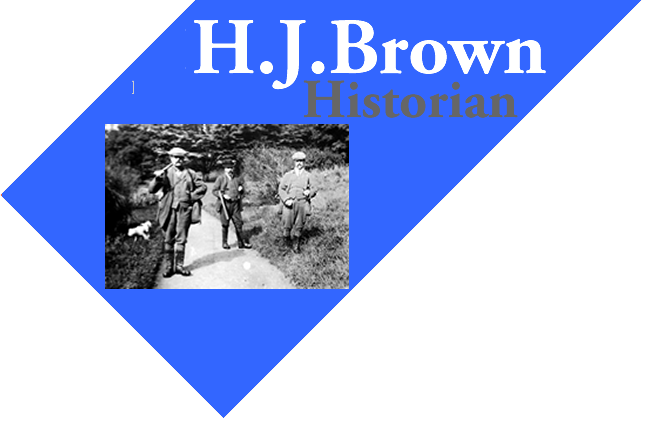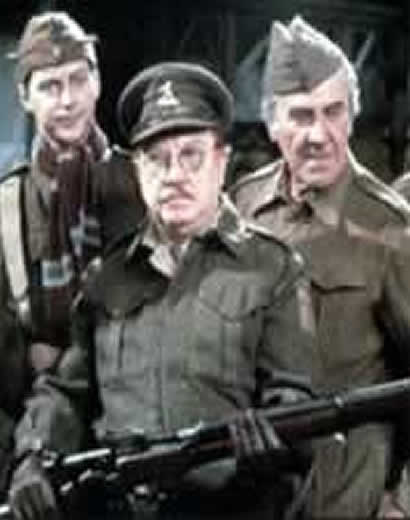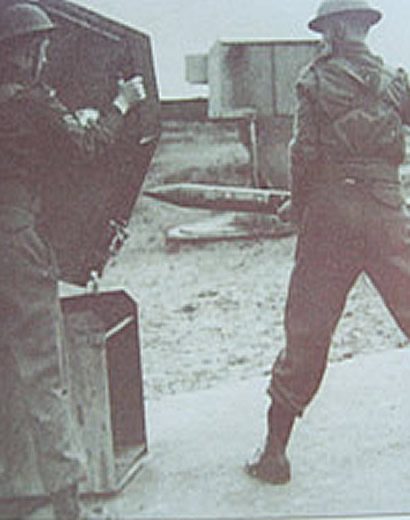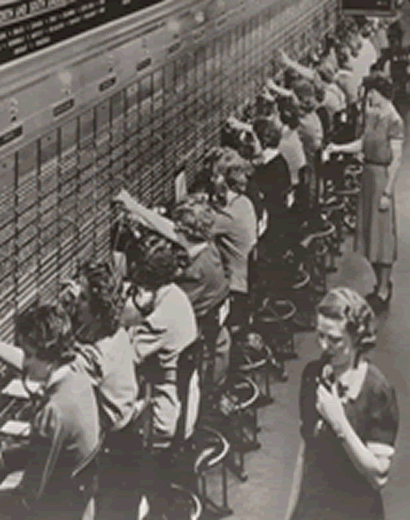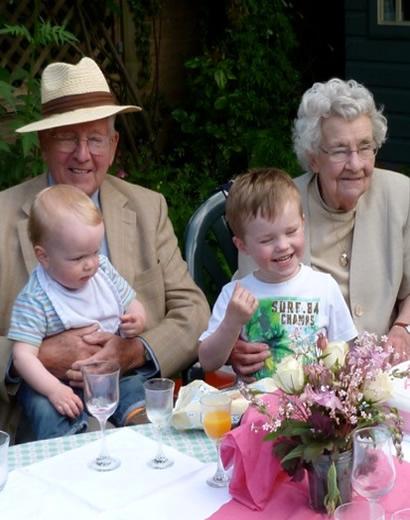Dads Post Office Army
Many people who watch with amusement the antics of Mr Mainwaring and the Home Guard (See Slide one of Images above) might not realise that in the last war the Post Office had its own Home Guard Battalions, whose escapades sometimes were just as hilarious as the TV classic.On the telephone side each exchange or group of exchanges formed companies and every night there were two or three home guards on duty at each building.
There were also fire watchers recruited from telephonists and other staff so this meant at large exchanges there were night telephonists, (See Slide Three of Images above) a night maintenance engineer , two or three fire watchers, and two or three home guards--quite a lot of people.Very often the same group were on duty together on the same night of the week. They developed their own ways of passing the night hours. Some were card fiends, some monopoly addicts ,some delighted in fry ups of any sausages etc they could get hold of and some just liked to argue.
In the early days weapons were in short supply . Only shotguns,metal clubs and a variety of makeshift weapons were available. As the war progressed ,however,the standard allocation became American .300 rifles of 1917 vintage together with bayonets , which were kept in guard rooms provided at most exchanges. Thompson sub machine guns also arrived together with Mills grenades and cup dischargers fot attaching to rifles to turn them into a type of mortar.Later still Sten guns were plentiful and guard rooms became small arsenals.
One weapon that seems only to have been issued to the Home Guard was the Northover Projector. This was a very crude gun or mortar like a drain pipe mounted on a tripod with a simple breech mechanism.When a missile such as a Mills grenade was inserted into the breech with the safety pin removed a charge was placed behind it so that as the breech closed it penetrated the charge. A cap was the n fitted to the outside of the touch hole and when the thing was fired a hammer struck the cap which flashed into the charge and away went the grenade releasing the lever as it left the barrel.
Some wag found that a small milk bottle also fitted the barrel and when this was fired on exercise the air whistling in the mouth of the bottle made it sound like a shell. Less dangerous was a rolled up ball of newspaper which on manoeuvres could give somebody a nasty shock. There was one story that a policemans helmet was the target!
It was all taken very seriously and standard army foot and arms drill was the order of the day. Before the war many regular soldiers and sailors who had completed their time with the colours were still in middle life and often came into the Post Office as postmen or labourers . Many gained good promotions before retiring but all of them knew about soldering in the old Empire. This meant there were many Corporal Jones with countless medal ribbons and drills were of a high standard because of their influence.
Exercises were always popular at weekends when attacking neighbouring exchanges was common. Blank ammunition was not available but I recall strings of fire crackers,similar to the Christmas variety, which you tied to the muzzle of your rifle and fired each in turn by pulling the string. External engineering lorries were used for trasport and linesmans tents sometimes used at camps. One night , G Company of the 22nd City of London Royal Fusiliers Post Office Home Guard Battalion --in other words engineers from Enterprise and Hillside exchanges in Noth London --were attacking Finchley exchange. It was a winters evening and we went by lorry to the vicinity where we disembarked and prepared to attack.As an extra novelty we had been provided with a smoke bomb like a huge firework with a fuse.Unfortunately it began to rain heavily and it was decided to seek shelter until it eased up.There was a church hall nearby where social activities were going on but they agreed we could go in out of the rain provided we kept out of the way of the table tennis.The offer was gratefully accepted and we huddled at the side of the hall, pleased to be in the dry.
At this point the man with the smoke bomb became worried about the fuse being wet . His friend of the know it all type, pointed out that the fuse was quite long and suggested that they light the fuse and confirm it burned all right and then snuff it out. They did so.The fuse was not only dry but very fast . No sooner was it alight than it flashed into the bomb setting up clouds of evil smelling brown smoke.Pandemonium broke out and somebody had the presence of mind to carry it outside but the hall was in a shocking state.
The angry inhabitants insisted that we leave, raining or not. As luck would have it the rain stopped and Finchley was attacked but without the smoke bomb.Who won was in doubt but we all had tea and biscuits in the exchange before going home to our beds.
With live ammunition knocking about it was inevitable that live rounds were accidentally fired and many exchanges had the scars to prove it. I never heard of anyone being killed but there were several near misses.During air raids there was great camaderie between all staff but, as in the TV classic the Home guard always thought they were a cut above Fire Watchers and the ARP.
As the war ended the Home Guard faded away like the old soldiers many of them were. Goodness knows what would have happened if Hitler had invaded! But anyone taking part will remember those days with a chuckle
March 1994 Edition of The Vet
